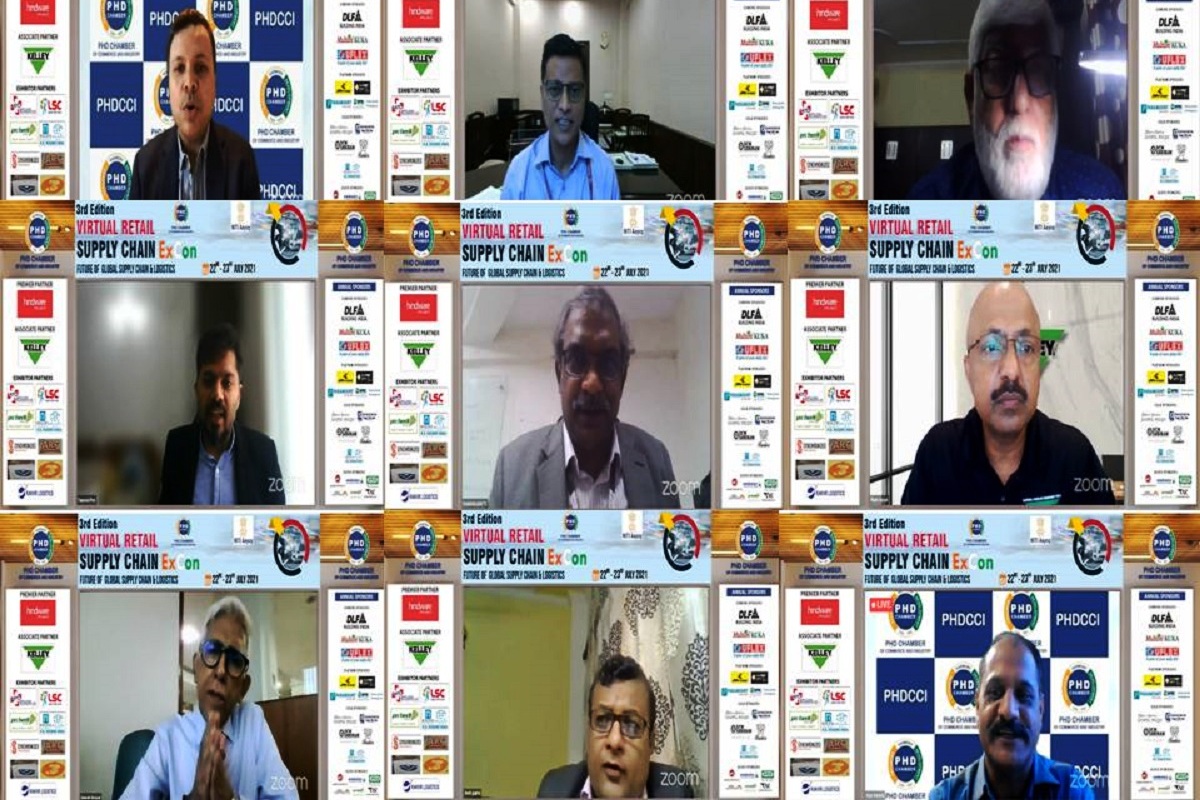PHDCCI delegation submits recommendation to FinMin on Budget-2025
PHD Chamber of Commerce and Industry (PHDCCI) on Thursday interacted with Sanjay Malhotra, Revenue Secretary and his team, on Pre-Budget Memorandum for 2025-26.
We need to integrate, changing mindsets and IT systems, creation of an infrastructure that will help in inter-modal connectivity.

(SNS)
The draft National Logistics Policy sets targets to try and reduce the overall national logistics cost that looks like a stiff target. But we think it’s possible to do due to a lot of work happening in the infrastructure and some process reforms have been taken place in the past few years.
We need to integrate, changing mindsets and IT systems, creation of an infrastructure that will help in inter-modal connectivity. Transportation; Warehousing & Inventory; Administrative and Order Processing are the key areas of focus which will help to reduce the logistics cost, mentioned Vikas Chaube, JS, Logistics, Ministry of Commerce & Industry in the technical session on Revolutionize Urban Logistics in the 3rd Edition Virtual Supply Chain Excon: Future of Global Supply Chain and Logistics organized by PHD Chamber of Commerce and Industry (PHDCCI).
Advertisement
Vikas Chaube opined that city logistics is an area of focus looking at the expansion in e-commerce and growing needs of the rural population. There is a need to maintain smooth systems, institutional mechanisms, right coordinating involving all stakeholders and authorities that will help to smoothen the working of city logistics. Cities should develop their city logistics considering their population, needs, freight, transportation, and other important factors. He mentioned that the five stages to better city logistics plan are data; institutional mechanism; creating a guiding mission; make an evaluation framework and find modes of arranging capital.
Advertisement
Talking about the challenges faced by warehousing he informed that the ministry is well aware of it. Many of the logistics are in the zone of the Government of India and state list which requires the involvement of a lot of stakeholders. But, the importance of this area is being looked after closely by the government and, developments are being taken place in the area of approvals.
Capt TS Ramanujam, CEO, Logistics Skill Council while moderating the session mentioned that there is a need to get all the regulators and stakeholders together for ensuring seamless working and development of the logistics sector. He also mentioned that there is a need for better IT and communication systems; improvement of the health of the employees; promote skill development; ease of doing business; improvement of freight management and, creating transit hubs.
Piush Goyal, Managing Director, Kelley Material Handling mentioned that there is a need for road infrastructure, different trucks based on the goods, and investment in technology for improvement in the logistics sector, especially in warehousing and hardware.
Tapaswi PVN, Head – Logistics, Henkel India apprised about mindset change in making the logistics sector more functioning, competitive and prosperous. He opined that there is a need for infrastructure and skill development which will lead to employment generation. There is also a need for a smart card for these truck drives to mitigate the rechecking of documents. He emphasized that rural logistics will also help in making smart cities. He also expressed his concern about the plight of trucks drivers and how the people should start respecting them on the same lines as cab drives to pull talent and make the transport industry more agile and robust.
Amit Gupta, Vice President, Synchronized Supply Systems mentioned that rural logistics have a lot of business opportunities due to rapid urbanization and increase in demand of retail sector but, there is a need for standard wages labor, fewer reservations, skill development of workers, and better IT connectivity.
Umesh Grover, Secretary-General, CFSAI while giving an overview about urban logistics, mentioned that there is a need for small trucks, increase costal shipping, and providing incentives for the same and more standardization.
Saket Dalmia, Vice President, PHDCCI while deliberating about the importance of the logistics sector in the development of the country and the increase in its demand in the retail industry, in which the logistics sector has become a strong backbone in the seamless functioning of this industry.
Vipin Vohra, Co-Chair Logistics Committee, PHDCCI while discussing the issues and challenges faced by the logistics sector in these times, mentioned that a policy needs to be developed which helps to recognize the logistics sector as an industry as it’s playing a major role in the development of the country at the same time help in trade regulation. He suggested that money should be invested in infrastructure that will help the brokers be equipped with modern equipment. He also suggested that there must be a legal policy for place allotment of warehouses and, the government should allot someplace in the different business parks to the warehousing that will help to reduce the transportation cost.
The event was attended by more than 500 industry stalwarts across the nation. PHDCCI’s session was sponsored by Somany Home Innovation Limited and Kelley Material Handling supported by DLF India; Multani Pharmaceuticals; UFLEX; JK Tyre & Industries; Marble City; Paramount Cables; SMC Investments and Advisors; Blossom Kochhar Aroma Magic; Comtech Interio; DCM Shriram Industries; Radico Khaitan; R.E. Rogers India; Ajit Industries; Synergy Environics; Timberworkz; Jindal Stainless; P S Bedi & Co; IFFCO and Hindware.
Advertisement